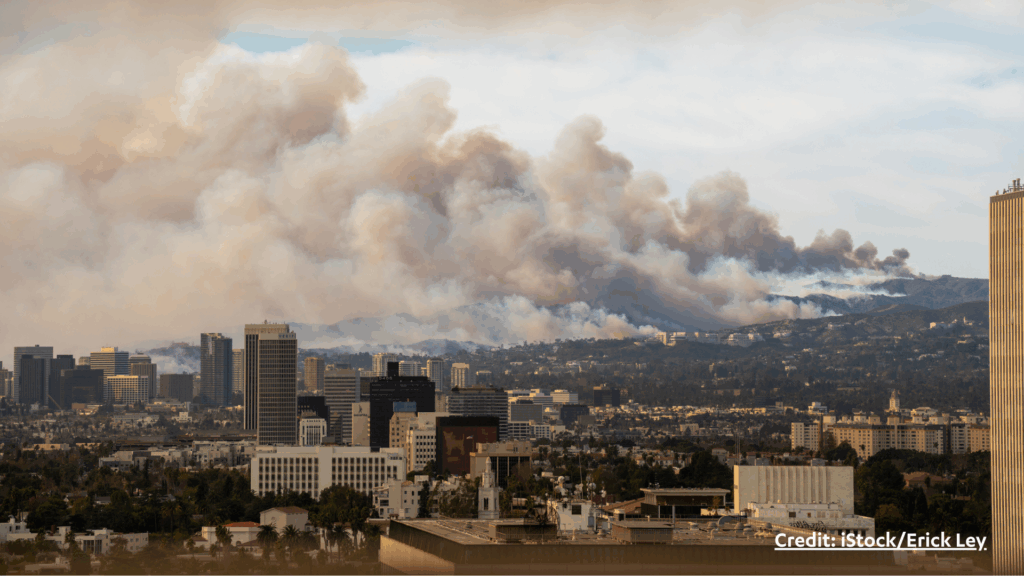FOR IMMEDIATE RELEASE
Contact: lppipress@luskin.ucla.edu
New UCLA LPPI and CNK Brief Series Documents the Impacts of Los Angeles Wildfires on Small Businesses
LOS ANGELES (October 13, 2025) — UCLA’s Latino Policy and Politics Institute (LPPI) and Center for Neighborhood Knowledge (CNK) have released a new three-part research series examining how the January 2025 wildfires affected small businesses in Los Angeles County—particularly in the communities of Pacific Palisades and Altadena.
The Economic Recovery and Entrepreneurship Project (TEREP), a collaboration between LPPI and CNK, produced the research to better understand how climate-related disasters disrupt local economies and to inform recovery efforts for small business owners.
The series provides the first integrated look at the pre- and post-fire business. The first brief establishes a baseline of the business landscape before the fires; the second quantifies structural damages; and the third examines short-term outcomes such as business closures and parcel sales. Over the next few months, UCLA researchers will continue to document the ongoing challenges and the solutions small business owners would like to see implemented, offering data-driven insights that guide long-term resilience and future disaster planning.
Key findings from the series include:
- Microbusinesses were the backbone of the local economy before the fires. They comprised the vast majority of establishments, and many operated from homes, linking business stability to housing recovery.
- Most businesses were inside the fire perimeters, and up to half of the exposed businesses were destroyed; microbusinesses account for most losses because they dominate the local base.
- Six months post-fires, formal exits were limited but concentrated among microbusinesses; relatively few businesses were tied to parcel sales, with sales skewing toward residential parcels in Altadena and commercial parcels in Pacific Palisades. Microbusinesses were at least as likely—and in some cases more likely—to be on sold parcels.
“Small businesses are the backbone of our local economies, yet they are often invisible in disaster recovery,” said Silvia González, director of research at LPPI. “Through this research, we can ensure their experiences are not only documented but also drive solutions that help communities recover and thrive after crises.”
“CNK’s mission is to understand neighborhoods, their institutions, and the people who sustain them. This project highlights the critical role of small businesses and the impacts they face from the wildfires. Through this research, we can identify barriers to recovery and help design policies and programs that promote a full and equitable rebuilding,” said Paul Ong, director of CNK.
The briefs form part of the LPPI and CNK’s broader commitment to generating actionable research that elevates the voices of historically overlooked entrepreneurs and helps policymakers, advocates, and business leaders design effective recovery strategies.
This research is made possible with the generous support of the Capital One Insights Center.
Read the briefs here.
###
About the UCLA Latino Policy and Politics Institute
The UCLA Latino Policy and Politics Institute is a non-partisan research institute that seeks to inform, engage, and empower Latinos through innovative research and policy analysis. LPPI aims to promote equitable and inclusive policies that address the needs of the Latino community and advance social justice. latino.ucla.edu.
About the UCLA Center for Neighborhood Knowledge
The UCLA Center for Neighborhood Knowledge (CNK) translates research into actionable neighborhood-related policies and programs that drive positive social change. The CNK specializes in empirical spatial analysis, focusing on diversity, differences, and disparities across neighborhoods, with particular attention to immigrant enclaves, low-income areas, and communities of color. knowledge.luskin.ucla.edu












